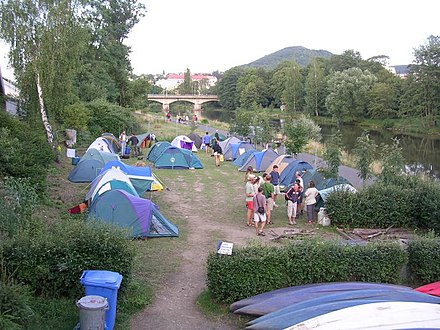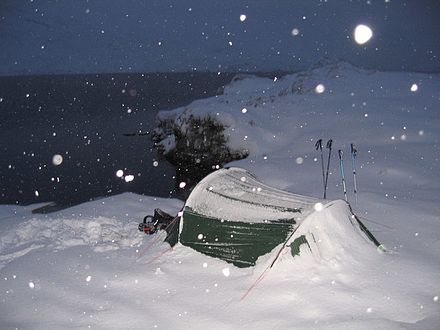Camping
Camping
Camping is do-it-yourself accommodation: you carry your roof and your bedding in your backpack or your vehicle. It's often the only choice of accommodation you have when you're travelling off the beaten track, but there are also very popular sites for camping holidays. Many car camping sites have an area for those coming with just a tent. On these, or other areas especially for campers, there are usually at least basic facilities, such as fresh water and toilets.
Wikivoyage has articles about different sorts of camping:
Campgrounds

Commercial campgrounds and similar can often be found outside cities and at vacation destinations. Often the campground caters to car campers as well as those coming only with a tent. Often there are also cabins or caravans for rent. The campgrounds usually have showers, kiosk, playground etc. However, facilities can range from the very basic (water that has to be boiled to be potable and outhouses for toilets) to something akin to a hotel with pre-built tents and permanently installed caravans for you to rent and supermarkets or private beach access.
When hiking
Camping is a common option in national parks and similar. Always check whether you need a permit to camp, how much it costs and whether your choice of site will be restricted. You generally need to get permits either in advance or on arrival. Many popular national parks or protected sites have limited camping to particular sites and some have banned it altogether. When hiking, there will often be set camp sites a day's walk apart, and often you are forbidden to camp between them. The facilities may be much more basic than at normal camping areas.
Permits can typically be obtained in advance or on arrival, but may be hard to get or sell out during very popular holiday periods. At very popular holiday periods the permits may actually be quite hard to get and sometimes sell out months in advance – don't blithely plan a Christmas camping holiday without being sure you can get a permit if you need one.
Wild camping

In e.g. the Nordic countries the right to camp is a fundamental part of the right to access: you may put your tent more or less anywhere for a night or two, as long as your camping does not disturb or harm nature or people (out of sight, out of mind, mostly, but keep out of sensitive areas and check campfire regulations separately). If you want facilities, use paid camping grounds. In protected areas, check local rules.
On the other hand, the United States has very strict laws on private property, and you are not allowed to step onto privately-owned land without explicit permission from the owner; in some areas it is legal for the owner to shoot you to defend his/her property should you do so. You can generally camp on public land with the exception of military areas if you leave no trace of your presence, but public and private land is often not clearly delineated, so be sure to do your research before you decide on a campsite.
Wild camping may be possible in any sparsely inhabited area, but check whether it is accepted practice. Sleeping rough is sometimes practiced where wild camping in the normal sense is not possible.

Glamping
Especially in Europe, third party companies and often campsites themselves rent out fully equipped tents or mobile homes ranging from the relatively basic and inexpensive to price and comfort on par with hotels or vacation rentals. Sometimes called glamping, it is camping with amenities and, in some cases, resort-style services not usually associated with traditional camping. Glamping has become particularly popular with 21st-century tourists seeking to combine the luxuries of hotel accommodation with the escapism and adventure recreation of camping. This type of camping has the upside of vastly reducing the amount of luggage you have to bring but limiting you to specific campsites. Some people think it dilutes the "true" camping experience.
Destinations
- Camping in the United States
- Camping in Israel
- California desert camping
- Hiking and bushwalking in Australia
- Hiking in the Nordic countries
- Right to access in the Nordic countries
- Primitive camping in Denmark
- Tramping in New Zealand
- Urban camping in Japan
See also
- Baggage
- Camping food
- Packing for a week of hiking
- Leave-no-trace camping
- Outdoor cooking
- Outdoor life
Related: Sleep